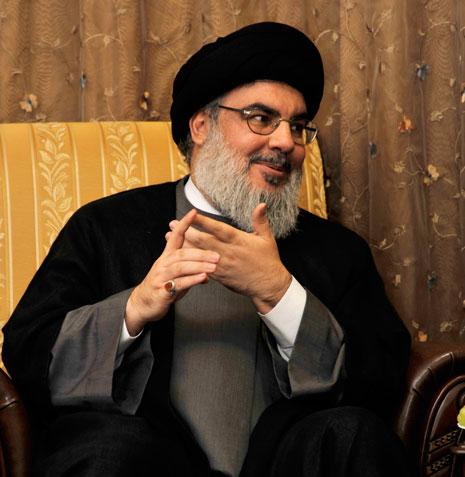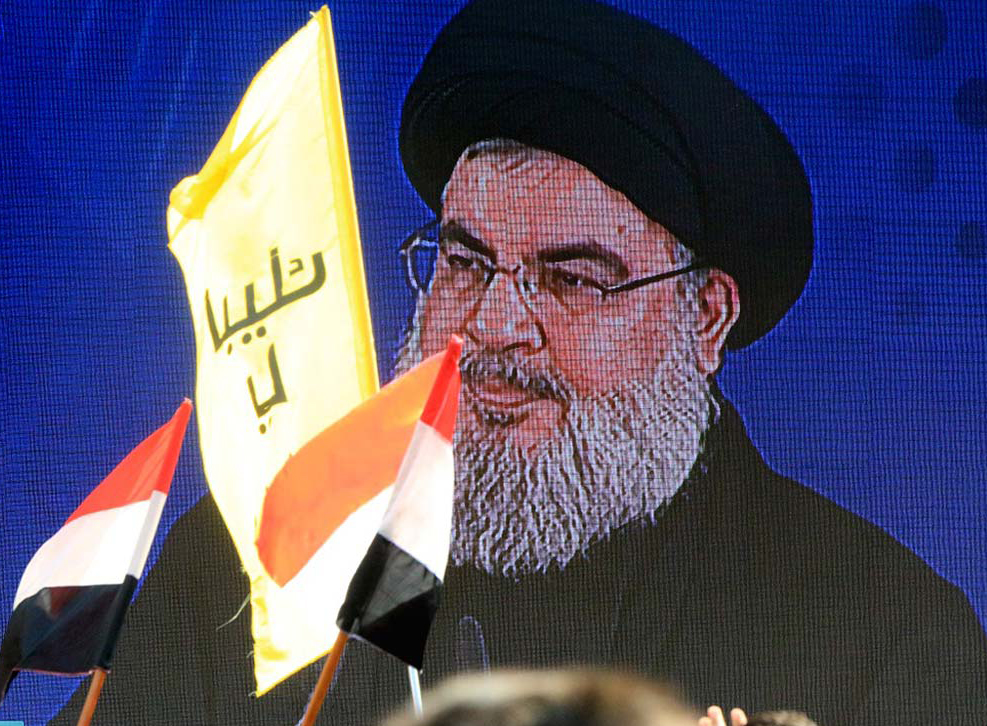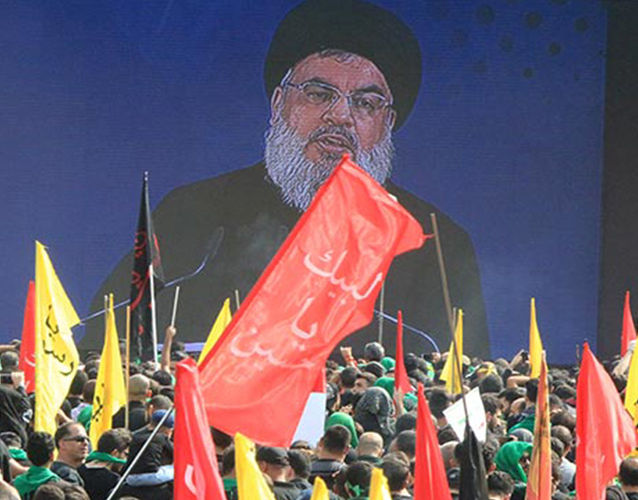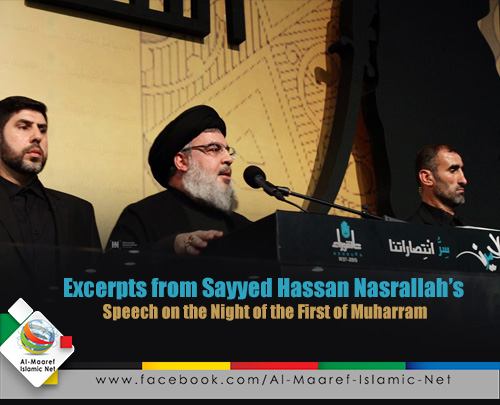Sayyed Nasrallah's Interview with Al-Akhbar: No Red Lines in Security War with Enemy
Hezbollah Secretary General, His Eminence Sayyed Hassan Nasrallah, confirmed Thursday that there are no red lines in the security war with "Israel".
In an interview with al-Akhbar, His Eminence highlighted that "Israel" knows "who is equivalent to Hajj Imad Mughnyieh."
Back to the 2006 "Israeli" aggression on Lebanon, Sayyed Nasrallah stated that "the decision to capture the two "Israeli" soldiers was taken by Hezbollah Shura Council, months before the operation."
"The brothers [the Mujahideen] used to enter the area [of capture]- even to the Palestinian territories-, trap them [the "Israelis"] for a while and then return and wait for the appropriate time."
He further recalled: "At the moment of the operation, we were following and we had already taken the necessary precautions and measures already planned for."
"The head of military operations moved to the place they should have been in since the early moments. The hours that followed the repercussions weren't great and dangerous. We absorbed what happened in a good way because we prepared well for the battle. After we were sure that the "Israeli" soldiers were transferred to a place away from the line of fire, I moved to the press conference to announce the capture."
- How does the Secretary-General act in these moments? What is his role specifically? Do you have all the perceptions and alternative plans about the mechanics of evacuation, move and others?
For sure, the SG is the decision-maker in managing the Jihadi side. Of course, he doesn't direct the combat and jihadi units directly and technically."
The Jihadi heads or whom we call the Jihadi assistants are responsible for that and they follow with the SG because he has the clear policies of the Shura council.. Thus, the SG is the side of decision-making, even on what is related to the battle on some events. He takes the decision in discussion sometimes and at other times in agreement with the Jihadi Council.
For example, this was the case with the territories we used to shell inside Occupied Palestine. It is not the field that will decide where to shell. We are to decide such stuff. When the decision is taken, the Jihadi officials would follow its implementation. They coordinate between the units, intelligence, the sides responsible for shelling and rockets' launching...
That means, when we say we are to enter the Haifa stage...this is a decision, the kind of weapons to be used is also a decision. To attack "Saar 5" is also a decision. Such decisions are taken by the Jihadi Council and the SG, as he is the head of the Council, after discussing and coordinating with the brothers. The sides responsible for procedures are responsible for management. And I'll be informed about them.
Why do we say that this is a decision? Because every step has its circumstances. For example, to target Saar 5 means that we decided to attack a qualitative goal- that would have great consequences.
Second, as we used the weapons for the first time, this means that the Jihadi Council decided to unveil a kind of arms not known to be in our hands.
After this decision, the discussion would turn to shed light on technical, executive, and implementing sides away from me that I won't interfere in; this is left to the specialists. Yes, when the Brother's contact me, they either tell me that "things are going fine" or that there are obstacles or difficulties. However, to solve them is their duty.
Another example is to hit Tel Aviv. This isn't a technical issue but a big decision. When Dahyieh [Southern Suburbs], and other Southern and Bekaa regions were being shelled, a serious discussion went on to decide whether we must hit Tel Aviv or not. As a result, we confirmed the "Beirut-Tel Aviv" [equation], Dahyieh and the remaining regions were in any way being excessively shelled. We said: "Let us create a new equation. If we could protect or help in protecting Beirut- for many reasons- let it be and this is better.
If this happened in 2006, would Tel Aviv be hit as it is being shelled from [seized] Gaza?
Of course, and much more. This is known and the "Israelis" know that. You are talking about missiles in various kinds and quantities. Of course, we had the ability to shell Tel Aviv. Otherwise, we don't threaten or talk about an equation that we aren't able to implement.
Were you under a direct threat during the war?
I wasn't hit directly and the place I used to reside in wasn't shelled by anything. Anyways, however, all the regions were targeted.
Is it true that the missiles fell near you while moving in your convoy?
Not true.
How did you spend your time during the first days of the war? We know that the Executive Council had great tasks, and the political negotiations hadn't yet begun. Were your followings continuous to the course of the war?
When I say that I do not interfere in the field, this doesn't mean that I don't direct it. I am concerned about the developments on the front: In the south and in the front positions in the Bekaa and the places that were being exposed to bombing, the martyrs, the wounded, the displaced, the people, the media, and the political atmosphere-- all this must be followed.
Were you seeing your family members during the war?
Yes, I saw them once.
Who was the first to see if you were alright once the war ended?
When the war ended, the ability of my movement was a little bit complicated. You remember that the war did not end with a cease-fire, but with a cessation of hostilities. We believed that we were still in the heart of the battle. Thus, immediately after the war, my movement was limited for a while.
Some figures insisted on meeting me. So, I used to respond: This is difficult on you and me.
The brothers viewed that the situation is risky, and that my appearance in any place may expose me and the other people to dangers.
The only place that I went to after the war was that of the late cleric, His Eminence Sayyed Mohammad Hussein Fadlallah. I visited him with a number of brothers to thank him for his attitude. During the war, the only people whom I used to meet were the Jihadi brothers.
On the internal communication network, I used to contact al-Manar and the Media Relations. There is no problem using our internal network of communication, unlike the mobile or wireless connections.
Sometimes, we used to record my speech and then broadcast it on the radio for our brothers who weren't available on our internal network. This happened.
Were you checking in on the displaced people during the war?
This did not need a personal visit because the nature of the movement was difficult. However, I was in direct contact with the brothers involved in matters of the displaced people. The whole party's structure was busy. I was in contact with all the officials. Therefore, I had a clear daily picture regarding the bombing, destruction and how to solve the problems of the displaced people. The subject of the displaced, the situation of the people, their mood and morale were priorities to us and on which decisions were adopted.
Were you surprised by the attitudes of the displaced?
No it didn't surprise me. But it surprised many people because there was a big bet on the displaced. There was also incitement in the media and in the circles of displaced people- in schools and elsewhere. Some political parties hoped that they [the displaced] hold demonstrations demanding the end to the resistance, or to disarm or make it surrender. They used to work on this.
The greatness of the people's attitude is not only because of their will, conviction, and awareness, but because they remained with these convictions in light of the war, destruction, displacement, killings and massacres as well as under big incitement.
If there is harmony and national unity and everyone encourages and strengthens the wills, a lesser grade would have been given to the people's position.
However, in fact, there was a climate of mistrust; inhibition of wills; and a holding of the resistance responsible for what had happened, encouraging the people to go out in demonstrations, but they refused.
During the war, what was the most scene that hurt you?
What was painful was the massacres. The military is usually hard, but our brothers- despite their tenacity- they were affected and some of them used to cry when they saw scenes of massacred women and children. Scenes of civilians being hurt were very harmful. Buildings would be re-built, the displaced would return at the end because it was clear that we would win, God-willing.
Several massacres occurred and we cannot say that one was more painful than the other. However, there is a certain specialty for the bombing of the Imam Al-Hassan compound; firstly, because of the great number of martyrs, and secondly, because of the rumors in Lebanon that the "Israelis" believed that I was there and thus they bombed the place. Of course, I had never gone to that place at any moment during the war.
Who was the person you feared for?
There is no specific person; there is a group of brothers, including Brother Hajj Imad. I thought that their survival was crucial because they were important in the course of the war and I was always concerned about their situation.
What was Syria's role during the war and what was the role of Brigadier General Mohammed Suleiman? Has any martyr fallen from the Syrian army?
During the war, the transfer of weapons didn't stop from Syria. It was not clear how long the war would last. Thus, whenever we had more abilities, weapons and ammunition, the situation was better. The potential of transportation was still available, despite the fact that "Israel" was targeting almost all the crossings. However, no one from the Syrian army was martyred because there were no bombings inside Syria.
As for the Martyr Brigadier General Mohammad Suleiman, I think that the "Israelis" are the ones who killed him because of his role before and during the war. He was assigned by [Syrian] President [Bashar] al-Assad to follow up on this file. He had a very excellent and positive role. Thus, after the war, the "Israelis" chased Hajj Imad and General Suleiman.
Some Arab media talked about internal liquidation.
It is clear to us from the investigation and the data field that "Israel" was behind it.
...more to follow



















